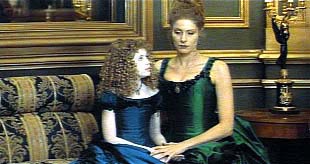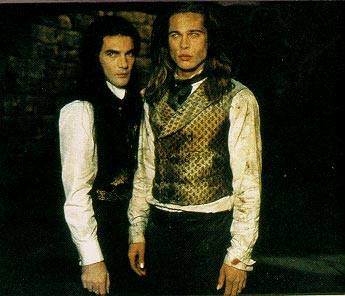





The Vampire Chronicles, written by Anne Rice, consist of a number of books written from the vampire's point of view. New books are still being added to the series, so not all books written may be included in this write-up. Interview with the Vampire is the first book of the series, and is oftentimes attributed to being the turning point between the 'Classic Vampire' and the 'Modern Vampire'. Previous to The Vampire Chronicles, society's image of the vampire was that of Bela Lugosi or Christopher Lee as a Romanian nobleman living in a far-off gothic castle. These vampires were two-dimensional beings of evil, not things we could relate to and sympathize with. They were portrayed as horrid monsters with the power of seduction, but not as a romantic superhuman figure. While Anne Rice was certainly not the first author to cast vampires in this new role, her books caught on in general society, and forever helped redefine vampire lore.
The most interesting part of this, is that her vampires are queer. Now, many will argue (and I've heard from a number of them) that this isn't true, that gay people are just trying to steal the vampire mythos for themselves. Generally the arguments fall into one of two categories: either a misunderstanding that the word 'queer' only encompases gay and lesbians, or homophobic assumptions involving characters aren't queer unless they're having same-sex sex, or that they can't be queer if a straight person can relate to them. These last assumptions have been refuted by Anne Rice herself, but homophobes generally don't let proof stand in the way of their beliefs.
Anne Rice herself has stated that her vampires are essentially bisexual, though they don't have sex. While they are capable of sexual acts, it is no longer important to them, as the very act of drinking blood is far more powerful. Some of these relationships were captured in the movies, so these are listed first.
 Louis
and Lestat
Louis
and LestatNow, whether Louis and Lestat form a gay-male union is unclear. As mentioned above, they do not have sex with each other. However, they do exude beauty and sexuality and are generally described as loving and desiring each other. Louis and Lestat are very intimate with each other, and are often quoted as being overwhelmed by each other's beauty, gazing longingly into each other's eyes, or even in sleeping together in the same coffin. But to the homophobic, even actions that would classify a person as being queer are meaningless in the context of a vampire.
At the start of 'The Vampire Lestat,' Lestat recounts
I had to find Louis. I had to talk to him. In fact, after reading his account of things, I ached for him, ached for his romantic illusions and even his dishonesty. I ached even for his gentlemanly malice and his physical presence, the deceptively soft sound of his voice.
Of course I hated him for the lies he told about me. But the love was far greater than the hate. He had shared the dark and romantic years of the nineteenth century with me, he was my companion as no other immortal had ever been.
In Queen of the Damned, we see a more physical expression of their relationship
"Lestat embraced his companion Louis, and they kissed on the mouth, as the mortal musicians put their arms around both of them.
 Claudia
and Madeleine
Claudia
and MadeleineOf lesser notice in the movie is a queer relationship between Claudia and Madeleine. Claudia and Madeleine are a queer couple in a couple of different ways. The first way has nothing to do with sexual orientation or desire. It is simply based on the fact that queer used to me "odd, unusual". etc. Their relationship is definitely odd, a vampire trapped in a child's body and a mortal woman she desires to change into a vampire.
The second reason is often hard for modern audiences to understand. While Claudia is trapped within the body of a child, she is not a child. By the time she found Madeleine, she was actually 60 years old. If Claudia were in a 60 year old woman's body, the question of her wanting Madeleine as a surrogate mother and protector would not be raised. Because the two are very strongly coupled in real life, it is very hard for many people to separate physical age from mental age. This is generally a good thing in real life (it recognizes that children need to be protected, and that forming intimate relationships between adults and children is not good). However, when stepping into fantasy and the supernatural, these beliefs can sometimes hold back understanding.
Claudia is seeking a companion for herself, and desires it to be a woman. Were she truly looking for someone who could protect her and fight for her, chances are she'd choose a man, as that was a trait ascribed men at that time period. And even if male vampires are not stronger than female vampires, there is no way Claudia could have known that, since she had never met a female vampire other than herself, and would have to draw assumptions based on the fact that male humans were generally stronger than female humans.
So, for whatever reason, Claudia is seeking a companion based not solely on protection. This companion is someone that she sees herself spending centuries with. I cannot say whether or not an intimate love existed between them. But, this relationship is close enough to a definition of a queer relationship to put it in that category.
 Armand
and Louis
Armand
and LouisArmand is a character we meet in the first novel who runs the 'Theatre de Les Vampires', a theater group that does plays that include vampires and, unknown to the audience, is run by vampires. His story is explored most fully in his own story 'The Vampire Armand', the sixth book in the Vampire Chronicles In this book, Armand is very open and candid about his same-sex interests while he was mortal.
Armand and Louis were shown to be quite infatuated with each other in the movie, to the point where it almost seemed that they would kiss on-screen.
As Claudia noted to Louis in the book 'Interview with the Vampire'
"'You would leave me for Armand if he beckoned to you. ...'
"'Never ...' I said to her.
"'You would leave me, and he wants you as you want him. He's been waiting for you. ...'
Her fears were later proven when Armand tells Louis so much directly, just a few pages later
"And after a long interval he said, 'I want you. I want you more than anything in the world.'
"For a moment I doubted what I'd heard. It struck me as unbelievable. And I was hopelessly disarmed by it, and the wordless vision of our living together expanded and obliterated every other consideration in my mind.
" 'I said that I want you. I want you more than anything in the world,' he repeated, with only a subtle change of expression.
In the books, it is also quite clear that Armand had quite a crush on Lestat, whom he had met far before Louis was even created. Lestat destroyed Armand's world and then left him to find himself, later returning to Armand for his help. We hear Armand's feelings in 'The Vampire Lestat'
"I love you, my dark brother," he whispered.
And the words moved through me like blood itself.
"It wasn't that I wanted vengeance," he whispered. His face was stricken, his heart broken. He said. "But you came to be healed, and you did not want me! A century I had waited, and you did not want me!"
And we also learn of Armand's effect upon Lestat when they first met in 'The Vampire Lestat,' as Armand tries to convince Lestat to become lovers.
Yet never had Nicolas, mortal or immortal, been so alluring. Never had Gabrielle held me so in thrall.
Dear God, this is love. This is desire. And all my past amours have been a shadow of this.
...
Who can love us, you and I, as we can love each other, he whispered and it seemed his lips actually moved.
Armand was also a companion of Marius, his sire, who created him far before Lestat ever existed. When Marius is again reunited with Amadeo (Armand) in 'Queen of the Damned,' he expresses
"My love," he whispered. He felt himself chastened suddenly as he had been earlier when he had flow up and up over the snowy wastes past the realm of the indifferent counds. Never had he spoken words more heartfelt. "My beautiful Amadeo," he said.
...
He tightened his arms around Armand. He kissed Armand's lips, and his long loose vagabond hair. He ran his hand covetously over Armand's shoulders. He looked at the slim white hand he held in his own.
...
"I love you," Marius whispered suddenly, passionately as a mortal man might. "I have always loved you. I wish that I could believe in anything other than love at this moment; but I can't."
Armand also took Daniel, the interviewer of Louis in 'Interview with the Vampire' to be his companion in the book 'Queen of the Damned.' As Armand tells us:
Lips against Daniel's face, suddenly, ah, that's better, I like kissing. And snuggling with dead things, yes, hold me. He buried his face in Armand's neck. Your blood.
"Not yet, my beloved." Armand pushed him forward, pressing his fingers to Daniel's lips.
And Daniel later speaks of Armand with
... of the quiet overwhelming presence of his immortal lover who gave him every earthly posession he could want.
David Talbot, is a member of the Talamasca, a hidden order that studies supernatural phenomena without getting involved directly. He is mentioned throughout many books, but is primarily featured in 'Tale of a Body Thief', the fourth book of The Vampire Chronicles. David is an openly gay man, who eventually becomes a vampire through an unusual mechanism. We learn briefly of a love affair he had with a mortal male during his younger years in this book.
During his mortal years, Lestat developed a relationship with another mortal named Nicolas. Eventually, Nicolas convinced Lestat to turn him into a vampire also when he discovered that Lestat had already been embraced.
In 'The Vampire Lestat' we see a little of their relationship when Armand threatens Lestat and Gabrielle in a church
I was weak and imperfect and a fool, and I would be torn limb from limb by his followers as soon as they appeared. They would roast my mortal lover slowly till he died.
In terms of queer content, 'Interview with the Vampire' was a dismal flop as a movie. Catering to the average public, rather than the people who actually would read the books, the movie shifts its focus dramatically. While the books focused mostly on the vampire's thirst for life: attending the opera, creating works of art, and creating a family... oh, and feeding on mortals whenever needed; the movie focuses on blood, blood, killing, vengeance ... oh and in between they teach Claudia to play the piano. There is one homoerotic moment between Armand (Antonio Banderas) and Louis (Brad Pitt), but that's all.
The pictures included on this page, and other pages, are from the movie. If there was a way to take them from a novel, I would.

